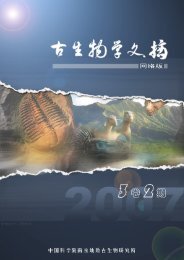Untitled
Untitled
Untitled
You also want an ePaper? Increase the reach of your titles
YUMPU automatically turns print PDFs into web optimized ePapers that Google loves.
2010010365<br />
在 塔 斯 马 尼 亚 的 单 食 性 生 态 系 统 与 古<br />
老 被 子 植 物 进 化 = Ecological monophagy<br />
in Tasmanian Graphium macleayanum<br />
moggana with evolutionary<br />
reflections of ancient angiosperm hosts.<br />
( 英 文 ). Scriber J Mark; Allen Geoff R;<br />
Walker Paul W. Insect Science, 2008,<br />
13(6): 451-460<br />
Local host plant specialization in an<br />
insect herbivore may be caused by numerous<br />
factors, including host-specific<br />
natural enemy pressures or a local lack<br />
of suitable host-plant choices that are<br />
available elsewhere in its range. Such<br />
local specialization or "ecological monophagy",<br />
for whatever reason, may reflect<br />
reduced ability to behaviourally<br />
accept or physiologically utilize other<br />
allopatric hosts that are naturally used<br />
elsewhere by the species. We tested this<br />
feeding specialization hypothesis using<br />
the Tasmanian subspecies of Macleay's<br />
swallowtail butterfly, Graphium macleayanum<br />
moggana (Papilionidae),<br />
which uses only a single host-plant species,<br />
Antherosperma moschatum (southern<br />
sassafras, of the Monimiaceae). Further<br />
north, this same butterfly species (G.<br />
m. macleayanum) uses at least 13 hostplant<br />
species from seven genera and four<br />
families (Lauraceae, Rutaceae, Winteraceae,<br />
and Monimiaceae). Our larval<br />
feeding assays with G. m. moggana<br />
from Tasmania showed that certain<br />
Magnoliaceae and Lauraceae could support<br />
some larval growth to pupation.<br />
However, such growth was slower and<br />
survival was lower than observed on<br />
their normal southern sassafras host<br />
(Monimiaceae). We also found that toxicity<br />
of particular plant species varied<br />
tremendously within plant families (for<br />
both the Magnoliceae and the<br />
Monimiaceae).<br />
2010010366<br />
蜻 蜓 的 化 石 卵 : 回 顾 和 阐 释 = Fossil<br />
ovipositions of dragonflies: Review and<br />
interpretation. ( 英 文 ). Vasilenko D V;<br />
Rasnitsyn A P. Paleontological Journal,<br />
2007, 41(11): 1156-1161 2 图 版 .<br />
The paper deals with the stratigraphic<br />
range and morphology of fossil formations<br />
on plants interpreted as insect ovipositions.<br />
Our analysis of the insect fossil<br />
record has shown that the endophytic<br />
ovipositions probably belong to the<br />
Kennedyina and Triadophlebiina (in the<br />
Paleozoic and Lower Mesozoic) and to<br />
the Calopterygina (in the Upper Mesozoic<br />
and Cenozoic).<br />
2010010367<br />
西 伯 利 亚 地 台 (Khorbosuonka 河 剖<br />
面 ) 东 北 部 早 寒 武 世 三 叶 虫<br />
Eodiscina 亚 目 = Trilobites of the suborder<br />
Eodiscina from the Lower Cambrian<br />
of the northeastern Siberian platform<br />
(Khorbosuonka River section). ( 英<br />
文 ). Korovnikov I V. Paleontological<br />
Journal, 2007, 41(6): 614-620 3 图 版 .<br />
Trilobites of the suborder Eodiscina<br />
from the Lower Cambrian section of the<br />
Khorbosuonka River (Siberian Platform,<br />
Olenek Uplift) are studied. The stratigraphic<br />
distribution of these forms in the<br />
section is shown Two new species, Hebediscus<br />
sublongus sp. nov. and<br />
Korobovia khorbosuonica sp. nov., are<br />
described. This is the first occurrence of<br />
the genus Korobovia on the Siberian<br />
Platform. The new record provides additional<br />
data on morphology and expands<br />
the paleogeographic range of the genera<br />
represented by the newly described species.<br />
2010010368<br />
古 生 代 Mesotitanina 亚 目 的 最 早 代 表<br />
及 对 巨 翅 目 ( 昆 虫 纲 : 多 新 翅 部 ) 系<br />
统 和 演 化 的 注 释 = The first representative<br />
of the suborder Mesotitanina from<br />
the Paleozoic and notes on the system<br />
and evolution of the order Titanoptera<br />
(Insecta: Polyneoptera). ( 英 文 ). Goro-<br />
112

















